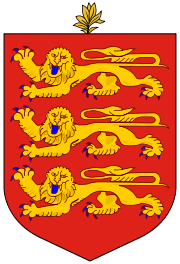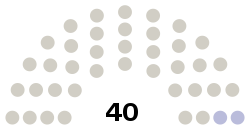States of Guernsey
| States of Guernsey États de Guernesey (French) | |
|---|---|
 | |
| Type | |
| Type | |
| Leadership | |
|
Sir Richard Collas Since March 2012 | |
Policy and Resources Committee |
Gavin St Pier Since May 2016 |
| Structure | |
| Seats | 40 |
 | |
Political groups |
|
| Elections | |
Last election | 27 April 2016 |
Next election | April 2020 |
| Website | |
|
www | |
 |
| This article is part of a series on the politics and government of Guernsey |
|
|
|
Foreign policy |
The States of Guernsey (French: États de Guernesey) is the parliament of the British Crown dependency of Guernsey. Some laws and ordinances approved by the States of Guernsey also apply to Alderney and Sark (the other component parts of the Bailiwick of Guernsey) as "Bailiwick-wide legislation" with the consent of the governments of those islands. All enactments of the States of Guernsey apply to Herm as well as Guernsey, since Herm is wholly owned by the States of Guernsey.
When constituted as a legislature, it is officially called the States of Deliberation. When constituted as an electoral college, it is officially called the States of Election.
Legislation passed by the States is termed Laws (Loi), which take effect in the island by Order-in-Council. Minor and secondary legislation does not require the assent of the Queen-in-Council and are known as Ordinances (Ordonnances).
States of Deliberation
The States of Deliberation consists of 38 People's Deputies, elected from multi-member districts every four years. Two Alderney Deputies are appointed by the States of Alderney to represent Alderney's interest in matters delegated by Alderney to Guernsey under the 1948 Agreement. The Alderney Representatives are full members of the States of Deliberation but are unpaid, and are chosen from the 10 members of the States of Alderney after an Alderney-wide plebiscite.
There are also two non-voting members being the Law Officers of the Crown - the Procureur (Attorney General) and the Comptroller (Solicitor General) both appointed by the monarch. The Bailiff presides over the States.
History
The legislature derives its name from the estates (French: états) of the Crown, the Church and the people from whom the assembly was originally summoned. The Jurats, representing the Crown, and the representatives of the Church of England were replaced in the constitutional reforms following the Second World War, when the office of Conseiller was introduced.
Until the General Election of 2000, there were 33 Deputies elected with three year mandates, and 12 Conseillers representing the Bailiwick, serving terms of six years, with half being elected every three. The Conseillers were not originally directly elected by the people (although latterly directly elected by Bailiwick-wide vote), and the office has now been abolished. The 10 Douzaine representatives (representing parish authorities) were removed from the States in the 2004 constitutional reform. In 2016 the number of deputies was reduced to 38[1]
Recent election results
The last general election was on 27 April 2016.
Current Deputies and Representatives
Constitution of the States of Deliberation as at October 2016:[2]
Castel DIstrict
- Richard Graham
- Chris Green - President Scrutiny Management Committee
- Barry Paint - President Transport Licensing Authority
- Mark Dorey
- Jonathan Le Tocq - Minister for External Affairs
Saint Peter Port North District
- John Gollop - President Development & Planning Authority
- Charles Parkinson - President States Trading Supervisory Board
- Lester Queripel
- Michelle Le Clerc - President Employment & Social Security Committee
- Marc Leadbeater
- Joe Mooney
|
Saint Peter Port South District
St Sampson District
South East District
|
Vale District
West District
Alderney Representatives
|